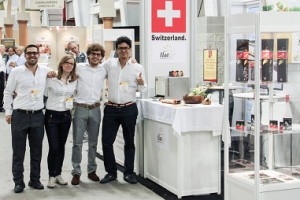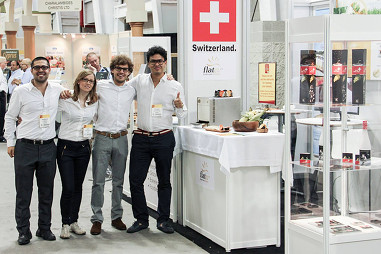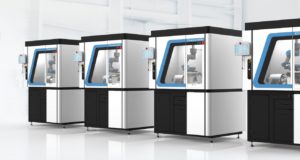
Carlos Ruiz, right, and his team from the startup Flatev show off their wares at a food show in New York (Flatev via Facebook)
Switzerland’s entrepreneurs who want to go global have trouble finding local markets and support, so they’re increasingly seeking fertile ground in the United States. Now, the largest-ever startup support programme has come calling in Bern to boost Swiss-American business relationships.
For Carlos Ruiz, it all started with a tortilla – or, more specifically, the lack thereof in his adopted home city of Zurich. The native Mexican came to Switzerland to study political science and was working on a master’s degree when he realised he wanted to take his business idea – a tortilla and bread maker that functioned with instant capsules, much like a Nespresso coffee machine – and turn it into reality.
Because of the global nature of his idea – “every culture has a kind of flatbread,” he says – Ruiz knew he had to break into the US market to have a shot at success with his company, called Flatev for “flatbread evolution”. But how? That’s where MassChallenge – a so-called “startup accelerator” based in Boston that’s the largest of its kind – came in.
Amir Eldad, who’s in charge of boosting MassChallenge’s global participation, recently presented the project to a handful of journalists at the American Embassy in Bern to boost its visibility and point out that despite the name, the programme reaches far beyond the borders of Massachusetts – it currently has a hub in Israel, one planned for London and is looking to expand further. Eldad says Switzerland “has the potential” to maybe become one of those global hubs someday.
But what’s the advantage of focusing on a small European country with only eight million inhabitants?
“In Switzerland and in other countries, the venture capital element of the ecosystem is not as strong as it should be, so we can help with that,” Eldad explains. “There’s a lot of effort being invested in the technology side, but not as much in the business side – we need to reach a better balance between technology creation and business support.”
“Switzerland is great in invention, but sometimes not so great in innovation,” says Professor Rico Baldegger of the School of Management Fribourg, a MassChallenge partner. “From the region of Fribourg and Bern we hope to have four or five applicants to MassChallenge this year.”
On the positive side, as Ruiz points out, Switzerland has a lot of attractive things to offer: his investors wanted him to keep the company incorporated in Zurich since they would not be subject to capital gains tax, and his collaborators on the technology were all trained at Zurich’s renowned Federal Institute of Technology (ETHZ).
Mutually beneficial
MassChallenge was born in the wake of the 2008 financial crisis, when founders realised the acute need to get foreign companies investing in the US and creating jobs there. During the programme, participants from around the world relocate to Boston, are matched with a mentor and set about gaining visibility and professional tips to launch their company – hopefully with a branch in the US.
“We hope that the kinds of companies that participate in MassChallenge become fantastically successful and think about investing in the United States,” explains Scott Woodard, economic and commercial officer at the US Embassy in Bern, noting that the United States currently spends 250 times what Switzerland does on support for startups.
Dorian Credé is a former ETHZ student who founded the crowd-sourced financial ratings platform WikiRating as an alternative to traditional platforms like Moody’s, Fitch or Standard & Poor’s. He is applying to MassChallenge this year with a spinoff project: an app that allows companies to quickly get feedback on their products and services from a crowd-sourced platform. He says such a project, which relies on lots of users to succeed, would be hard to get off the ground anywhere but the US.
“Here in Switzerland, it’s very hard to scale products and services where many people are needed.”
“Most huge IT breakthroughs happen in the US because the market is huge, the language is uniform and the mindset is quite open,” he adds. “These factors lead to this huge advantage compared to Europe, where you have a very fragmented situation.”
Although Credé will have to leave his pregnant wife and re-locate to Boston for four months if he’s chosen for the programme, he says it’s worth the effort because it’s a clear way in to the all-important American market, which isn’t easy to come by.
Room to grow
Niccolo Iorno, innovation project leader at Swissnex Boston, says startup programmes like MassChallenge, venture leaders and the CTI Market Entry camp, to name a few, are all bringing Swiss startups to the US partially with a view to creating jobs there – but the ball has been a bit slow to get rolling.
“I am receiving many questions from Swiss startups that are willing to come and set up an office here (in the US). But although they have a couple of business development people or salespeople, they don’t have the critical mass yet,” he says.
“But eventually, I think it will come.”
Ruiz already has employees on the ground in Boston and plans to launch his product in the US first. But the last steps are the hardest: fine-tuning the final 10% of the product itself so it’s affordable to customers, and securing the funding to go into production. For that financial support, he’s mostly turned to foreign investors from Brazil, Britain and France – and not to Switzerland, where he’s had more trouble getting commitments for large amounts of money.
“There is a point in the startup where if you want to get really big, some investors here are very risk averse and it’s easier to go abroad.”
By Veronica DeVore
Source: swissinfo.ch







